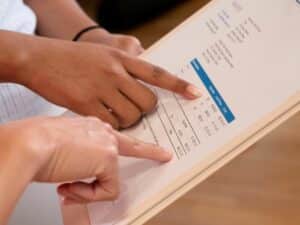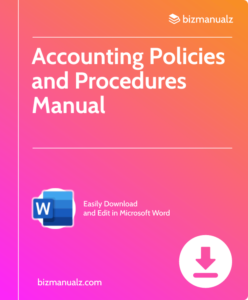How to Check for Accounting Mistakes or Errors

Accounting blunders can be costly and hurtful to a business. It is vital to have a systematized process in place to check for these goof-ups. Here, we will provide you with valuable information on how to effectively identify and set right accounting mistakes or errors. How to check for accounting mistakes or errors.
Accounting Mistakes or Errors
Efficiently managing the financial records of a business is essential for its success. However, even the most meticulous bookkeepers can make mistakes. So, it is important to have a well-defined procedure to spot and fix any discrepancies that may come up in the accounting process.
One way of checking for accounting mistakes is through regular reconciliations. This means comparing the financial data recorded in your books with external sources such as bank statements or invoices. Any inconsistencies should be thoroughly looked into and solved straight away.
Another effective way to identify potential errors is by careful analysis of financial statements. By carefully examining income statements, balance sheets, and cash flow statements, you can detect inconsistencies or irregularities that may show an accounting mistake. Pay close attention to figures that appear out of line or do not agree with industry standards.
Moreover, it is important to set up internal controls within your organization. Implementing segregation of duties ensures that multiple employees are involved in the accounting process, lessening the danger of intentional or unintentional errors going unseen. Regular audits conducted by independent professionals can further check the accuracy of your financial records.
Pro Tip: As businesses grow, it becomes increasingly essential to invest in reliable accounting software. It not only makes operations easier and reduces manual entry errors, but it also offers comprehensive reporting capabilities for simpler identification of mistakes.
By following these practices and continuously monitoring your financial records, you can minimize the occurrence of accounting mistakes or errors. Remember that prevention is always better than correction when it comes to maintaining precise and dependable accounting information.
Importance of Checking for Accounting Mistakes or Errors
Accurate checking for errors is essential for successful accounting processes management. Regular checks guarantee financial info integrity and reliability. Small errors could have serious consequences, such as wrong decisions or legal issues.
Regular reviews of accounting records are needed to spot any data entry or calculation discrepancies. The importance of this can’t be overstated, since mistakes in financial statements can hurt a company’s reputation and erode stakeholder trust. Inaccurate reports also restrict effective decision-making.
Promptly spotting accounting errors prevents compounding effects and future complications. This safeguards financial stability and preserves relationships with investors, creditors, and regulatory authorities.
Detailed review of financial records improves internal control systems. It enhances fraud prevention by noticing irregularities or inconsistencies that may point to unauthorized activities. Checking ensures account balances accuracy, verifies transactional info and highlights potential signs of fraudulent behavior.
Common Types of Accounting Mistakes or Errors
Accounting errors or mistakes can be often made. These errors can be a problem for businesses and individuals. Here are some common ones to look out for:
- Data Entry Errors – Wrong data inputted into the system. Typos or misinterpreted numbers can lead to wrong financial statements and reports.
- Calculation Errors – Incorrectly calculated figures can result in wrong totals, percentages, and ratios. This can cause issues with other calculations.
- Omission Errors – Omitting transactions or expenses from books can make records inaccurate. This can lead to not following reporting standards and legal requirements.
- Reversal Errors – Debits and credits reversed while recording transactions can affect the balance between assets and liabilities.
- Posting Errors – Entries posted to wrong accounts in the general ledger can cause cash flow tracking problems.
These are only a few examples. Each business will face different financial management issues. To make sure accounting is accurate, businesses should implement internal controls and regular audits. Also, duties should be segregated among employees.
Recognizing and addressing these accounting mistakes or errors quickly can help a business reduce risks and make better financial decisions. Don’t let them stop you from being successful. Make accuracy and precision a priority.
Tools Needed for Checking Accounting Mistakes or Errors
Mending accounting mistakes or errors is important for the precision and trustworthiness of financial data. To identify these errors successfully, certain tools are essential. These tools help in organizing the process, making sure accuracy, and decreasing manual labor. Here are some major tools which can make error detection in accounting easier:
- Spreadsheets: Using spreadsheets helps in orderly organization and calculation of financial info. Functions such as SUM, AVERAGE, and IF can be employed to check figures and find out possible errors.
- Accounting software: Utilizing specialized accounting software automates many operations and lowers human error. Such tools often have features like automatic calculations, integrated error checks, and complete data validation.
- Scheduled reports: Setting up automatic reports helps keep track of financial action regularly. Through analyzing these reports, discrepancies or strange patterns can be located quickly.
- Audit trail analysis: This technique requires reviewing transaction history to trace any anomalies or inconsistencies. Audit trail analysis allows for a thorough examination of each step involved in a transaction.
- Bank reconciliation: Regularly comparing bank statements with internal records not only helps detect errors but also guarantees precision in financial reporting.
- Data backups: Making regular backups of financial data safeguards against unintended deletion or loss. In case an error is recognized, having backups allows for easy recovery without influencing ongoing activities.
Also, it is essential to often update these tools to stay in line with industry standards and employ newly-introduced features which improve error detection abilities.
Pro Tip: Even though these tools are crucial, it is equally necessary to depend on trained professionals who have a sound knowledge of accounting principles. Their knowledge plus the right set of tools will ensure precise error detection and prevention during the financial reporting process.
Step-by-Step Process to Finding Accounting Mistakes or Errors
Checking accounting mistakes or errors is a must for accurate financial records. This process guarantees transactions are documented correctly and stops inconsistencies. Follow this step-by-step guide to effectively check accounting mistakes or errors:
- Check Source Docs: Look at source documents like invoices, receipts, bank statements, and purchase orders. Match these docs with the corresponding entries in accounting records to locate discrepancies.
- Confirm Entries: Verify each entry in the accounting system by comparing with source documents. Ensure amounts, dates, and accounts fit properly.
- Reconcile Bank Statements: Perform regular bank reconciliations to recognize discrepancies between records and those of the bank. This reveals errors like missing transactions or incorrect balances.
- Do Audits Periodically: Regularly conduct audits to review financial records thoroughly. This involves confirming account balances, auditing expense claims, and examining supporting documentation for important transactions.
- Use Accounting Software Tools: Take advantage of accounting software tools that automate error-checking processes. These tools alert potential mistakes such as duplicate entries or incorrect calculations, saving time and cutting human errors.
It is crucial to pay close attention to detail when checking accounting mistakes or errors. Minor oversights can cause major discrepancies in financial reports, leading to inaccurate analyses or decision-making.
Pro Tip: Involve a third-party professional who specializes in accounting inspections or audits to give an unbiased assessment of your financial records and guarantee their accuracy and dependability.
Tips and Techniques to Identify and Correct Accounting Errors
Identifying and fixing mistakes is super important in accounting. Here’s how to spot and fix them properly:
- Double-check calculations. Exactness is key, so make sure to double-check numbers, formulas, and equations.
- Compare to earlier periods. Comparing current figures to data from before can uncover errors.
- Reconcile accounts. This guarantees all transactions are recorded accurately and helps find mistakes.
- Check supporting documents. Cross-check with invoices, receipts, and bank statements to find errors and missing entries.
A bonus tip is using software or tools designed to detect errors. They can quickly scan data for inconsistencies, and provide real-time updates and reports.
Finally, communicate with your accounting team. This can help uncover errors faster and stop future ones from happening.
Case Studies or Examples of Accounting Mistakes and How to Rectify Them
Accounting mistakes can have serious impacts on businesses. Knowing how to spot and fix them is crucial. Let’s look at some real-life examples and steps to correct them:
| Example | Rectification |
|---|---|
| Inaccurate bookkeeping | Verify all bookkeeping entries and fix any errors. |
| Failure to reconcile bank statements | Reconcile bank statements with accounting records regularly. |
| Misclassification of transactions | Check the chart of accounts and reclassify them correctly. |
It’s important to comprehend why the errors happened. This helps stop similar mistakes in the future and protects a business’s financial health.
Interesting fact: The Association of Certified Fraud Examiners (ACFE) found that billing schemes account for 23% of occupational fraud cases around the world.
Proactive Measures to Prevent Accounting Mistakes or Errors
Having a thorough understanding of accounting is key to a successful business. To dodge pricey blunders, it’s essential to put in place proactive measures that avoid mistakes. Here’s a 4-part guide to help you out.
- Reconcile Accounts Regularly: Audit your accounts often to make sure all transactions are recorded correctly. Use software or get professional help to compare your financial records with bank statements and other documents.
- Put Internal Controls in Place: Create a system of checks and balances within your business to stop fraud or unintentional errors. This could mean separating duties, having periodic reviews, and requiring management consent for major transactions.
- Keep Up with Regulations: Accounting standards and regulations change often, so it’s important to stay informed. Monitor updates from relevant regulators and make sure your accounting practices comply with the newest rules.
- Spend on Training & Education: Give ongoing training to your accounting staff to improve their knowledge and skills. Schedule workshops or seminars talking about new trends in the field, or motivate them to gain certifications or extra qualifications.
By following these proactive steps, you can reduce the risk of accounting errors or mistakes in your organization.
Did you know? According to the Association of Certified Fraud Examiners (ACFE), organizations lose an estimated 5% of yearly earnings due to fraud annually (Source: ACFE).
Check for Accounting Mistakes or Errors
In conclusion, verifying accounting mistakes is a must for financial accuracy. By using reliable software and accounting procedures, companies can reduce the risk of costly errors and secure their financial documents.
When looking over financial statements, it’s important to focus on small details that can point to errors. This involves validating data, balancing bank statements, and doing regular audits. With thorough and consistent checks, businesses can find inconsistencies quickly and take action right away.
Moreover, modern accounting software can simplify error detection. These programs offer features such as automatic data validation and instant warnings for potential problems. Companies can save time and raise accuracy by taking advantage of technology.
One particular example of the importance of error checking is the Enron scandal. In the early 2000s, Enron Corporation was found to have committed accounting fraud, leading to bankruptcy and criminal proceedings. This incident showed how essential it is to have proper oversight and careful checks to stop unethical practices and protect investors.
Frequently Asked Questions
 1. How can I check for accounting mistakes or errors?
1. How can I check for accounting mistakes or errors?
An effective way to check for accounting mistakes or errors is to reconcile your financial statements with your bank statements. Compare your records with the bank transactions to ensure accuracy.
2. What should I do if I find an accounting mistake?
If you discover an accounting mistake, you should immediately correct it by adjusting the affected accounts. Document the error and the steps taken to rectify it for future reference.
3. Are there any software tools available to help identify accounting errors?
Yes, there are various accounting software tools that can automate error detection. These tools provide features like automatic bank reconciliation, error alerts, and financial statement analysis to help identify and rectify mistakes.
4. How often should I perform a thorough check for accounting mistakes?
It is recommended to perform a thorough check for accounting mistakes at least on a monthly basis. This helps ensure that any errors or discrepancies are caught early and can be corrected promptly.
5. What are some common accounting mistakes to watch out for?
Common accounting mistakes include data entry errors, incorrect classification of expenses or revenues, missing or duplicate entries, and mathematical errors. Regular review and reconciliation of accounts can help identify these errors.
6. Should I consider hiring an external auditor to check for accounting mistakes?
Hiring an external auditor can be a good option, especially for larger businesses or complex accounting systems. An external auditor can provide an unbiased and independent review to identify any errors or irregularities.
















Leave a Reply